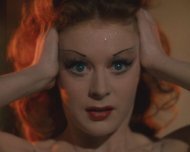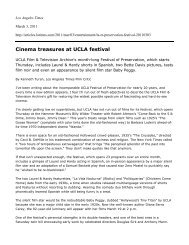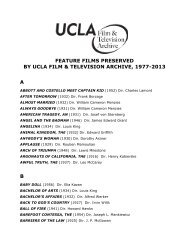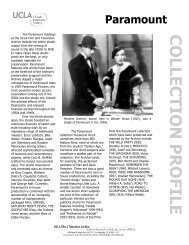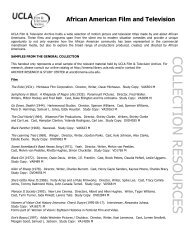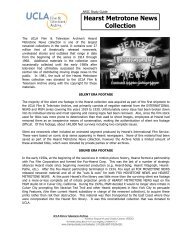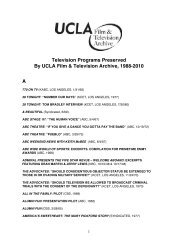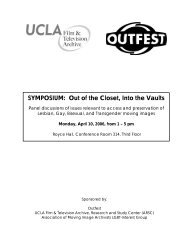"Heroic Grace" catalog - UCLA Film & Television Archive
"Heroic Grace" catalog - UCLA Film & Television Archive
"Heroic Grace" catalog - UCLA Film & Television Archive
Create successful ePaper yourself
Turn your PDF publications into a flip-book with our unique Google optimized e-Paper software.
what heroes mean when they say “my kung fu is better than yours.” The<br />
war between the sexes is enacted as a competition between the “Tiger”<br />
and “Crane” styles of kung fu, and when Hong Xiguan (Chen Guandai)<br />
meets the beautiful Fang Yongchun (Li Lili), their duel is ironically accompanied<br />
by a tune from Carmen (“If I love you, woe to you!”). Romance,<br />
then marriage is in the air, but on their wedding night, the drunken jokes<br />
of Hong’s companions annoy Yongchun so much that<br />
she uses her “Crane” techniques to lock her legs closed. Hong counterattacks<br />
with an assault on a secret pressure point, and the scene ends<br />
on the joyful sounds of kung fu moves being used as foreplay. Yongchun<br />
is as close to a feminist superwoman as the wuxia pian has yet produced:<br />
she can fight, but she can also cook, clean, do the laundry, and<br />
rule the roost. From alluring sex object she is elevated to the status of<br />
Mother/Goddess, yet is not given a chance to fight the villain herself.<br />
COME DRINK WITH ME depicts a darker version of fighting-as-sex.<br />
Entering the temple where the gangsters are hiding, but now dressed as<br />
a woman, Golden Swallow is at once surrounded by Jade-Faced Tiger and<br />
his cronies. Her long gown hides the daggers she has slipped into her<br />
boots, and the basket she carries shields her against arrows and<br />
weapons. Dueling with her, Tiger slices through her clothes, and, laughing<br />
with “the boys,” promises to “undress [her] right now.” More than a<br />
match for her adversary, Golden Swallow nevertheless loses her composure<br />
when her top is (slightly) undone, and as a result is hurt by Tiger’s<br />
poisonous dart.<br />
Tiger’s sexist spite in this scene may have another source. At the<br />
beginning of the film, we see his face light up at the prospect of testing<br />
himself against such a famous warrior as Golden Swallow. To his secret<br />
disappointment, he has to fight a girl.<br />
THE GAZE<br />
Zhang Che’s films create what has been interpreted as an unabashedly<br />
homoerotic space in which men fight men; admire, kill, compete with<br />
men; and court the friendship of other men. 27 They stage the “passion”<br />
of the suffering male body, over-exerting itself, wounded, bleeding, tortured,<br />
transfixed by sharp objects (even, in later works, impaled), lying<br />
down, with limbs extended, after a violent death. Within the fiction, this<br />
spectacle is constructed for the male gaze, with, sometimes, the female<br />
gaze functioning as a relay or substitute.<br />
In the beginning of ONE-ARMED SWORDSMAN, handsome Fang Gang<br />
(Wang Yu) removes his jacket to chop wood, while his master’s spoilt<br />
daughter, Qi Pei (Qiao Qiao) looks on. Her repressed attraction for the<br />
young man may be read as a tragic metaphor for unrequited homosexual<br />
desire; she pines for him, but, dismayed at his “arrogance,” refuses to<br />
admit it. Shortly thereafter, out of spite, she cuts his right arm off. Since<br />
Wang Yu spends the rest of the film dressed in a way that hides the<br />
character’s wound (and the actor’s carefully concealed right arm), the<br />
wood-chopping scene is the only moment in which he is given a chance<br />
of displaying his muscles. Fang Gang’s wound becomes the equivalent of<br />
the female’s “castrated genitals” and has to be carefully hidden.<br />
Zhang Che was obviously convinced that weapons shouldn’t be handled<br />
by women, and his distrust of the feminine applies to male characters<br />
that are guilty of treachery. In ONE-ARMED SWORDSMAN, the villains’<br />
27 See in particular Stanley Kwan Kam-pang’s film, YANG+YIN: GENDER IN CHINESE<br />
CINEMA (NANSHENG NÜXIANG, Channel 4, UK, 1995).<br />
28 His “castration” has liberated Fang from the lure of the feminine. It was not<br />
always so. At the beginning of the film, because of his secret attraction to Qi Pei, he<br />
is distracted by her pouting and moaning, unaware that she prepares to maim him.<br />
29 Kaja Silverman, Male Subjectivity at the Margins (New York and London: Routledge,<br />
1992), p. 199.<br />
30 Gilles Deleuze, Masochism: An Interpretation of Coldness and Cruelty (New York:<br />
Vintage Books, 1980), p. 58.<br />
22<br />
secret weapon—a two-pronged “sword clamp” device that captures the<br />
opponent’s blade—brings to mind one’s worst fantasies of the mythical<br />
vagina indentata (“tooth-lined vagina,” a metaphor for the castrating<br />
female). It is because the hero is “castrated” (and forced to fight with a<br />
shorter sword) that he won’t be “caught” by the feminine device. 28<br />
In Zhang’s BLOOD BROTHERS (CI MA, 1973), the female protagonist, Mi<br />
Lan (Jing Li), intervenes from the outset, spelling trouble between the<br />
men. As the two brother-thieves, Zhang Wenxiang (David Jiang Dawei/<br />
David Chiang) and Huang Zhong (Chen Guandai), and would-be general Ma<br />
Xin (Di Long/Ti Lung) lay the foundation for their relationship, Mi Lan<br />
arrives on horseback to steal Ma Xin’s bag of gold. She is doing so on her<br />
husband’s, Huang Zhong’s order, but her entry into the all-male tableau<br />
nonetheless has a jarring effect. Later, when Mi Lan stops acting as a wife<br />
to behave as a subject by falling in love with Ma Xin, she causes catastrophe.<br />
The real culprit, however, is Ma Xin, who betrays the “brotherhood,”<br />
first through personal ambition, then when he yields to his passion<br />
for Mi Lan.<br />
What one remembers in BLOOD BROTHERS, however, are the spectacular<br />
scenes in which each of the three “brothers” is put to death. Here<br />
exhibitionism is clearly linked with masochism, and the work of the narrative<br />
is to bring us to the moments where these beautiful bodies are<br />
displayed in pain. It has been noted that by stressing the importance of<br />
intricate, lengthy rituals and preparation, masochism creates a certain<br />
form of narrative suspense. 29 Zhang Che’s flamboyant sexual economy<br />
brings to light the true relationship between the narrative elements and<br />
the moments of fighting and killing. The “plot” is there to delay those<br />
moments of pleasure, in which the spectator can vicariously experience<br />
the thrill of being simultaneously the executioner and the tortured,<br />
bleeding body.<br />
And whose gaze represents that of the spectator? For the killings of<br />
Huang Zhong and Ma Xin, other men (soldiers) are looking on. However,<br />
the public execution of Zhang Wenxiang, carried on with minute sadism<br />
by Ma Xin’s minions, is a more complex affair. Indeed, the last shot is a<br />
freeze frame of the executioners gloating. But, in a tower, hidden behind<br />
curtains, Mi Lan, in tears, is looking on.<br />
Married to Zhang’s brother, Mi Lan is virtually put, by virtue of the<br />
incest taboo, in the position of the forbidden Mother. Like Prometheus on<br />
his rock, it is for her gaze that the hero suffers. Offering the annihilation<br />
of his own cumbersome masculinity to her, he hopes to end the<br />
symbolic debt to a dead father, to a brotherhood of men, as well as the<br />
relentless training/killing/revenge scenario on which the jiang hu is<br />
based. For Gilles Deleuze, the male masochist yields to an all-powerful<br />
Mother/Goddess figure from a “mythical and timeless realm” to “exorcise<br />
the danger of the father.” In his submission, the masochist seeks to “kill<br />
the father in him.” 30<br />
Unfortunately, the hero is mistaken—and this is why so many wuxia<br />
pian end tragically. The Mother had given him a book to read. It was full<br />
of gaps. Instead of concentrating on the gaps, like a Zen Buddhist meditating<br />
on the void, he thought the text was important. So he became a<br />
fighting hero, reproducing the endless cycle of violence. And he lost the<br />
Mother forever.<br />
copyright @ 2003, Bérénice Reynaud<br />
Bérénice Reynaud is the author of Nouvelles Chines, nouveaux cinémas<br />
(Paris, 1999) and Hou Hsiao-hsien’s “A City of Sadness” (London, 2002).<br />
Her work has been published in Cahiers du cinéma, Libération, Sight and<br />
Sound, Screen, <strong>Film</strong> Comment, Senses of Cinema, Cinemascope, Cinemaya,<br />
and the Asian <strong>Film</strong> Quarterly, among others. She teaches at the California<br />
Institute of the Arts.




